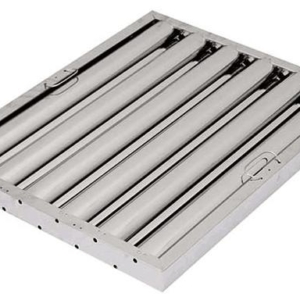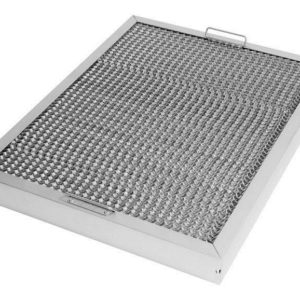Maintaining a clean, safe, and efficient environment is critical in any commercial kitchen. Kitchen exhaust systems play a vital role by removing smoke, heat, and grease-laden vapours from the air. Without a properly functioning exhaust system, these contaminants can build up, leading to poor air quality, safety hazards, and even regulatory violations.
The filters are at the heart of any exhaust system. Their main function among others, is to trap grease and particles before they reach the ductwork. Without them, grease can accumulate, increasing the risk of fire and system inefficiency.
Why Selecting the Right Filter is Crucial for Your Commercial Kitchen
Compliance
Australian health and safety regulations require commercial kitchens to have effective ventilation systems. Local codes and Australian Standards such as AS 1668.2 are enforced to ensure that kitchen air remains clean and safe. Failure to comply can result in hefty fines, shutdowns, or worse—kitchen fires. The right exhaust filter helps you meet these regulations by efficiently capturing grease and particles.
Efficiency
Proper filtration improves air quality and enhances the overall performance of your kitchen equipment. Grease build-up in ducts can restrict airflow, causing your exhaust system to work harder, leading to higher maintenance costs and potential equipment failures. Filters help prevent this, keeping your kitchen running smoothly.
Cost Savings
Selecting the correct filter can significantly reduce energy consumption in your kitchen. A clean, efficient filter allows for better airflow, which means your exhaust fans won’t have to work as hard. This reduces energy usage and prolongs the life of your kitchen equipment, leading to cost savings over time.
Environmental Considerations
Certain filters can help kitchens prioritise sustainability by reducing emissions and meeting environmental goals. Reusable filters, for example, reduce waste, while others are designed to be more energy-efficient, lowering your kitchen’s carbon footprint.
Key Factors to Consider When Choosing a Commercial Kitchen Filter
Type of Cooking
The type of food preparation and grease output in your kitchen will largely determine the filter you should use. High-grease kitchens, such as BBQ and fried-food establishments, require more robust filters like baffle filters. Lower-grease environments, like bakeries, can benefit from mesh filters.
Airflow and Ventilation Requirements
Airflow must remain unobstructed for optimal ventilation. Your chosen filter should allow air to flow efficiently while trapping particles. Clogged filters reduce airflow, making the system work harder and increasing energy costs.
Fire Safety and Compliance
All filters must meet Australian fire safety standards. Baffle filters are particularly favoured due to their fire-safe design. Compliance with AS 1668.2 ensures your kitchen exhaust system minimises fire risks.
Durability and Cost-Effectiveness
While mesh filters are affordable, they may need frequent replacement, increasing long-term costs. Stainless steel baffle filters, while more expensive upfront, offer superior durability and require less frequent replacement, making them more cost-effective.
Ease of Cleaning and Maintenance
Filters that are easy to clean and maintain will reduce downtime and help your kitchen run smoothly. Consider how accessible the filters are for cleaning, whether they can be cleaned in-house, and if professional cleaning services will be necessary.
Environmental Impact
Selecting reusable filters, such as stainless-steel baffle or honeycomb filters, contributes to sustainability by reducing waste. Mesh filters, while effective, tend to have a shorter lifespan and contribute more to landfill waste. Choose filters that align with your sustainability goals.
4 Types of Commercial Kitchen Exhaust Filters You Can Choose
Understanding the types of commercial kitchen exhaust filters available will help you select the most appropriate one for your kitchen’s needs. Each type has unique advantages and is suited for different cooking and kitchen environments.
1. Baffle Filters
Baffle filters, typically made from stainless steel or aluminium, are designed with interlocking baffles that direct airflow. As the air moves through these baffles, grease particles are forced to change direction, causing them to condense and adhere to the metal surfaces. Baffle filters offer several advantages, such as high durability, ease of cleaning, feature built-in fire safety mechanisms, and compliance with fire safety regulations.
These types of kitchen filters are ideal for kitchens with high grease production, such as BBQ restaurants or fast-food establishments. However, depending on the kitchen’s usage, regular cleaning is essential, either manually or through professional services. Consistent maintenance helps prevent grease build-up, ensure proper airflow, and reduce fire risks.
2. Honeycomb Filters
Honeycomb filters are made from aluminium or stainless-steel grids designed in a honeycomb pattern that provides a large surface area for trapping fine particles. This structure allows the filter to capture grease particles and vapours effectively.
Critical advantages of honeycomb filters include their high filtration efficiency, lightweight design, and ability to trap oil mist and smoke. They are particularly suited for kitchens that produce fine grease and vapours, such as wok kitchens or cafes with deep fryers.
Honeycomb filters require frequent cleaning to maintain their efficiency. Their design allows them to be easily rinsed or cleaned with a degreasing solution.
3. Mesh Filters
Mesh filters comprise multiple layers of fine aluminium or stainless-steel mesh designed to trap grease and particles. These layers effectively capture and retain smaller particles, making them suitable for light-duty filtration. Mesh filters are lightweight, affordable, and ideal for kitchens with low to moderate grease output.
They are best suited for low-grease environments like bakeries or sandwich shops. However, mesh filters have a shorter lifespan compared to other types and are less effective in kitchens with high grease production. Regular inspection is needed to assess when cleaning or replacement is required. Although the cleaning process is straightforward, high-use kitchens may need to replace them more frequently.
4. Cyclonic Filters
Cyclonic filters operate on the principle of centrifugal force to separate grease and other particles from the airflow.
Cyclonic filters are highly efficient in removing grease from exhaust air and are often preferred in high-output commercial kitchens that generate large amounts of grease and smoke, such as steak houses or grill-heavy establishments.
These filters are durable, require minimal maintenance, and reduce the need for frequent cleaning, as the design naturally directs grease away from the airflow, depositing it in a collection area that can be periodically emptied.
However, while cyclonic filters are effective in capturing large grease particles, they may not be as efficient in trapping finer particles or smoke compared to other types, like honeycomb filters. Regular inspection is still essential to ensure optimal airflow and filtration efficiency, particularly in high-grease environments.
5 Signs It’s Time to Replace Your Exhaust Filters
- Reduced Airflow: A significant drop in airflow indicates that your filter is clogged with grease and debris. This reduces the efficiency of your ventilation system and can lead to overheating and equipment damage. Cleaning or replacing the filter promptly is essential to restore proper airflow.
- Visible Grease Build-Up: If you notice excessive grease accumulation on your filters, it’s a clear sign that they are overdue for cleaning. Built-up grease can create a severe fire hazard by igniting under high cooking temperatures, putting your kitchen at risk.
- Unpleasant Odours: Clogged filters can trap odours from grease and food particles, leading to poor air quality. This can affect the comfort of your kitchen staff and create a negative customer experience.
- Increased Energy Consumption: Dirty filters force your exhaust system to work harder to maintain airflow, increasing energy usage and operational costs.
- Noise from Exhaust System: Excessive noise from your exhaust system often indicates that airflow is restricted due to clogged filters. This suggests that the system is struggling to function and requires immediate attention.
See also: Kitchen Filter Exchange and Cleaning Services in Australia
Maximise Kitchen Safety and Efficiency with the Right Commercial Kitchen Filters
Selecting the right exhaust filter for your commercial kitchen is essential for maintaining air quality, ensuring safety, and enhancing operational efficiency.
With various filter types available, it’s crucial to consider factors such as cooking style, grease output, and maintenance needs. Regular filter cleaning and timely replacements are vital to avoid potential hazards and ensure compliance with health and safety regulations.
Where To Buy Commercial Kitchen Filters in Australia
For businesses looking to maintain, clean or purchase kitchen filters in Australia, Lotus Commercial is here to help. We offer filter sales and professional maintenance services to ensure your exhaust systems operate at peak performance. Contact us today!



